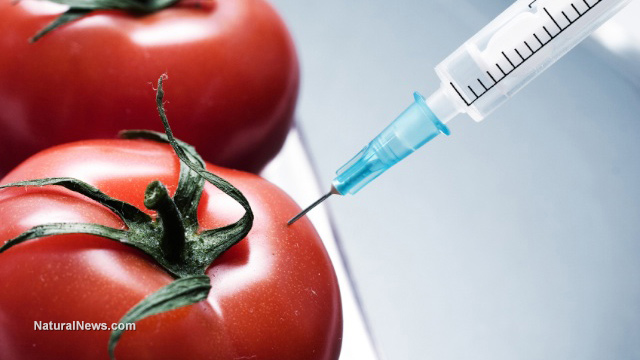Monsanto's fraudulent tomato patent revoked by patent office
Monday, December 29, 2014 by: Jennifer Lilley
Tags: Monsanto, fraudulent patents, tomato plants

- Newly released JFK files reveal Pentagon's role in creating Lyme disease and covid in the same lab
- Trump nominates VACCINE ZEALOT Susan Monarez to lead the CDC, sidelining RFK Jr.'s reform efforts
- Obama accused of laundering USAID funds to fuel global protest movements, regime change operations
- HUGE: Putin claims 2020 election fraud in U.S. sparked Ukraine war, calls for peace talks with Trump
- Chris Rufo finally reveals abuse liberals unleashed on his wife and young kids...
- Deep State in disarray: Trump's funding freeze sows chaos, Democrats vow legal battle
- Trump shows his true colors
- STARDUST, a secretive Israeli-US startup, plans risky solar geoengineering experiment to BLOCK OUT THE SUN
- Trump's greatest betrayal so far: Accelerating Middle East wars, silencing dissent, and serving Zionist masters
- $2B Roundup verdict: A landmark blow to Bayer and a win for health freedom
- Outrageous government fraud: $312M in COVID loans went to children as young as 9 months old
- Festive flavors: The sweet history, nutritional profile and health benefits of pecan pie
- Elon Musk: Aliens could be here on Earth RIGHT NOW
- SWEET SABOTAGE: CIA's secret war on Soviet sugar revealed in JFK files
- Dr. Mike Yeadon releases 15-minute testimony - WATCH - about genocidal intent of COVID “vaccines”
- “Forever chemicals” in drinking water drive alarming cancer surge, new study warns
- A mysterious startup is developing a new form of solar geoengineering
- Govt. agency closed by DOGE looked like a palace inside, with oil paintings fit for a KING...
- Newly released JFK files reveal Pentagon's role in creating Lyme disease and covid in the same lab
- Elon Musk: Aliens could be here on Earth RIGHT NOW
- Reclaim your health: How midlife exercise reverses years of inactivity
- Trump reverses course on Gaza plan, says “nobody is expelling Palestinians”
- EPA advisor admits the agency is funneling billions to climate groups ahead of Trump’s return to White House
- Big Pharma's $8 Billion bribery scheme exposed: how doctors are pushed to prescribe junk science, not heal
- Space war brewing? Russia threatens to destroy Starlink satellites
- A lack of integrity in Academia: Harvard professor found GUILTY of fraudulent research to promote CRT theory
- Survival 101: Effective EMF blocking techniques
- Rep. Nancy Mace introduces bill to ban biological males from female facilities on federal property
- Mike Adams Sermon 66: God will DESTROY ISRAEL for its wickedness
- Pilots report mysterious lights 'moving at extreme speeds' across Oregon skies
- 5 Simple steps to boost your brainpower: How to strengthen executive function in a distracted world
- Historian warns Israel may be entering an “IRREMEDIABLE DECLINE”
- Florida takes a stand: DeSantis proposes permanent ban on mRNA vaccine mandates
- RFK Jr.'s SSRI antidepressant investigation sparks liberal meltdown, exposes Big Pharma's dangerous game
- OpenAI whistleblower who dissented against how the company trained ChatGPT found dead
- Sugarcane extract superior to cholesterol-lowering drugs?
- EPA advisor admits the agency is funneling billions to climate groups ahead of Trump’s return to White House
- The Health Ranger releases “Vaccine Zombie” song and music video, using AI-animated zombies for the music video
- California's social media censorship law struck down: A victory for free speech or a threat to online safety?
- Dr. Mike Yeadon releases 15-minute testimony - WATCH - about genocidal intent of COVID “vaccines”
- The pandemic as a tool for INDOCTRINATION: Understanding “The Indoctrinated Brain” by Dr. Michael Nehls
- Mike Adams releases country western hit single: Goin’ Back in Time is Comin’ Home
- Mike Adams releases music poetry sensation: A Child of God
- RFK Jr. clears key hurdle: Sen. Susan Collins backs controversial HHS nominee, signaling a new era for health policy
- Florida takes a stand: DeSantis proposes permanent ban on mRNA vaccine mandates
- Unpacking the Lies That We’ve Been Fed – new song and music video released by Mike Adams, the Health Ranger
- Mike Adams releases new song and music video: Nothing More Disgusting Than a Globalist
- Congratulations to the FULLY UNVACCINATED as you resisted the COVID-19 PROPAGANDA MACHINE fueled by over $100 BILLION
- “Why we influenced the 2020 elections”: Facebook files reveal the coordinated effort to bury the Hunter Biden laptop story
- Michigan sheriff announces criminal investigation into 2020 election crimes, Dominion Voting Systems
- Israeli soldiers accused of even more torture and abuse in the West Bank
- Migrants are taking advantage of recent hurricanes to scam residents and loot their homes
- House Intelligence Committee calls for the ARREST and PROSECUTION of Dr. Anthony Fauci
- Peter Rost exposes Big Pharma corruption in his book “The Whistleblower: Confessions of a Healthcare Hitman”
- Red Cross issues warning to stop blood plasma donations from vaccinated people
- Scientists confirm: GENIUS brain function can be spontaneously unleashed in humans without any apparent cause
- EPA advisor admits the agency is funneling billions to climate groups ahead of Trump’s return to White House
- HYSSOP: What research reveals about the health benefits of this ancient holy herb
- Two containers with completed ballots fall out of truck in Florida
- Fully vaccinated about to see “tsunami” of illness and death, warns virologist
- Global leaders unite to clamp down on “misinformation” with UN-backed Cascais Declaration
- BREAKING: 2025 NDAA authorizes mandatory military draft of WOMEN across America… as Pentagon pursues global NUCLEAR war with both Russia and China at the same time
- Michael Yon warns of a ZIONIST TAKEOVER in Trump’s second administration
- BOMBSHELL: DNA testing kits are a SCAM to develop ethnic-specific bioweapons
- Ozempic and Wegovy weight loss drugs are injectable LIZARD VENOM PEPTIDES that may unleash a devastating wave of organ failure… side effects align with symptoms of SNAKE BITES
- Israeli soldiers accused of even more torture and abuse in the West Bank
- These 13 countries just signed an agreement to engineer a global FAMINE by destroying food supply
- NASA admits that climate change occurs because of changes in Earth’s solar orbit, and NOT because of SUVs and fossil fuels
- RFK Jr. clears key hurdle: Sen. Susan Collins backs controversial HHS nominee, signaling a new era for health policy
- Sermon 30: How Jesus reveals Caesar’s FAKE CURRENCY and FALSE AUTHORITY
- Coriander seeds: Ancient medicine backed by modern science
- Arizona officials claim Maricopa County needs 10-13 days to tabulate results of the election
The reason for the patent not going through is, unfortunately, not much of a surprise.
As Natural News readers know, there are many documents riddled with loopholes and laws that squeak by based on cleverly crafted words. The situation was no different in this case; it was ultimately determined that Monsanto was attempting to be wise wordsmiths, saying that their patent focused on conventionally bred tomatoes that had a natural resistance to botrytis, a fungal disease, and should therefore be considered as an intervention. However, the tomatoes for the patent were accessed from an area in Germany that already had the resistance to begin with; Monsanto was attempting to pull the wool over people's eyes by indicating that their techniques were unique and, therefore, patent-worthy.(1)
Monsanto's patent attempt "abuse of patent law and biopiracy"
"Revoking this patent is an important success," said Christopher Then, a coordinator with No Patents on Seeds! "It was more or less based on a combination of fraud, abuse of patent law and biopiracy. The patent could have been used to monopolise important genetic resources. Now breeders, growers and consumers have a chance of benefiting from a greater diversity of tomatoes improved by further breeding." He explained, "The intended resistance is based on complex genetic conditions, which are not known in detail. So genetic engineering is clearly not an option in this case."(1)No Patents on Seeds! hopes that this success spurs many others. In particular, they're eyeing the EPO for their slew of patent-granting practices that includes genetically engineered plants, many of which are owned by Monsanto. Considering that Monsanto already controls approximately 25 percent of the international seed market, No Patents on Seeds! is striving to prevent them from expanding their market domination so that consumers have a range of food choices, and healthier ones at that. Specifically, they're asking that the European government put more pressure on the EPO so that fair and accurate patent interpretation is practiced going forward. Furthermore, they would like to see revisions in European Patent Law so that breeding material, plants, animals and food derived from them are excluded from patentability.(1)
Of the need to address these patent practices, the No Patents on Seeds! website asks, "Is the patent industry taking control of our food?" The related article further questions the future of food, honing in on the full patent opposition report regarding Monsanto's tomato patent. "Will our daily food soon be controlled by big corporations and the patent industry, or will our politicians make decisions to ensure that patents on plants and animals are prohibited?"(2)
Dire need to address plant and seed patents as "we are at a critical stage"
The brief article precedes a PDF of the full patent opposition report, a report which includes highly scientific details pertaining mostly to molecular markers and botrytis. A portion of it states the following:Thus far... breeding programs aimed at providing resistance to Botrytis in tomato have had limited success. The reasons for these poor results is at present not clear. For one part, this may be due to insufficient knowledge on the genetic basis and inheritance of Botrytis-resistance. For another part, this may be due to the lace of proper bioassays for assessing Botrytis-resistance levels in tomato plants obtained in breeding programs. The lack of knowledge and methods also complicates the selection of plants among both wild accessions and offspring plants that compromise genes involved in resistance to Botrytis.(3)
"We are at a critical stage," the preceding article notes of the alarming amount of plant and seed patents either approved by, or slated to be approved by, the EPO. "The scope of many of the patents that have been granted is extremely broad and very often covers the whole food chain from production to consumption. These patents are an abuse of patent law, designed to take control of the resources needed for our daily living."(2)
Sources:
(1) http://www.no-patents-on-seeds.org
(2) http://www.no-patents-on-seeds.org
(3) http://www.no-patents-on-seeds.org[PDF]
Monsanto at FETCH.news
Get independent news alerts on natural cures, food lab tests, cannabis medicine, science, robotics, drones, privacy and more.
Take Action: Support Natural News by linking to this article from your website
Permalink to this article:
Embed article link: (copy HTML code below):
Reprinting this article:
Non-commercial use OK, cite NaturalNews.com with clickable link.
Follow Natural News on Facebook, Twitter, Google Plus, and Pinterest
Science News & Studies
Medicine News and Information
Food News & Studies
Health News & Studies
Herbs News & Information
Pollution News & Studies
Cancer News & Studies
Climate News & Studies
Survival News & Information
Gear News & Information
News covering technology, stocks, hackers, and more



"Big Tech and mainstream media are constantly trying to silence the independent voices that dare to bring you the truth about toxic food ingredients, dangerous medications and the failed, fraudulent science of the profit-driven medical establishment.
Email is one of the best ways to make sure you stay informed, without the censorship of the tech giants (Google, Apple, Facebook, Twitter, YouTube, etc.). Stay informed and you'll even likely learn information that may help save your own life."
–The Health Ranger, Mike Adams













































